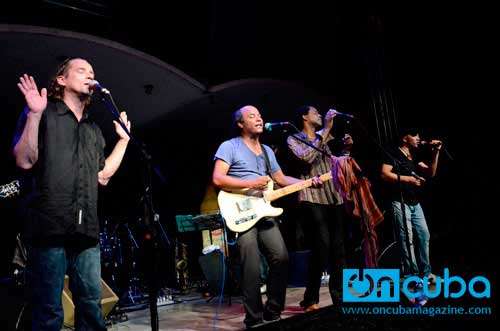Photos: Alain L. Gutiérrez
The striking thing about the concert by Habana Abierta was that slight shade of unreality. Practically no one could believe it.
Expectation is a metaphysical condition. It depends on how long or how short the wait might be, paradoxically a very specific requirement. One decade – in the case of Cuba – or the whole life – in my particular case, for two hours and fraction of show is a disproportionate proportion. We have waited so long and in so many different ways that we have come to think that we were not waiting for them.
That is to say, somehow we forgot that those people existed, that they were Cubans and that they had to come again to this country. I don’t know how we pretended to go on without listening to them on the stage, live. But there was a slight mistake. We overlooked the fact that they would grow old. Being – as they are – artists, we thought their faces and gestures would remain the same. That the years and probably the uprooting – those two demolishing forces – were not going to run over them with such cruelty. Their voices and quality are identical, sure, but that visual forcefulness plays its role.
They returned from the war, an invisible war where defeat is declared in advance, with marks like mouths open on the skin. José Luis Medina is now an incredibly self-centered man, much slower and discreet, with clear wrinkles and indubitable loss of passion. Vanito is not the way we had imagined him – an irreverent mulatto from Santiago de Cuba composing in the phantasmagoric Havana of the nineties – but a man over forty years of age who migrated to Spain, with a vertical projection, with a not too leading role on the stage, bald, with an extravagant aesthetics. Whether we want it or not, those images, so definitive, portray a history of tremendous weight. A cry to be heard if we look at it well.
We couldn’t do anything – I’m not saying as a country, which is too much to ask, but as individuals – to prevent these musicians to waste themselves far away. Nothing to prevent the absence from leaving a physical trace on them. Nothing to stop them from performing in lost stages, before exotic publics. Nothing to prevent the surprise we now received concerning their age. What did we suppose? That they were going to be there, untouchable, always for us? What did we pretend? That they would remain unharmed, so that we would console ourselves thinking that nothing had happened?
Well, it did happen. And Habana Abierta, a virtuous group wherever they may exist, played at La Tropical as if they had arrived, not from Europe but from our respective and select memories. I at least listened to the concert with an explosive emotional load and an involuntary overawe. That was the place where you guessed you would meet persons with whom you had shared at some point the taste for music as well as many other tastes. A place where dispersion would syncopate again, far from impertinent coincidences.
On Friday evening I joined old friends, visited every now and then the most recent ones, sang what I had already sung on other nights in very different stages and recalled that age between fifteen and twenty when I discovered Habana Abierta and when everything you learned – sex games, literature tricks, dancing steps, the identity of a music piece – you learned with excessive vehemence – if only that were possible – as if vehemence itself were not sufficiently excessive to be enough.
A Japanese offered me red Hollywood cigarettes and I accepted them. I smoke for a while. I drank rum and beer crazily. I searched for specific persons and found them abruptly, as if I were going somewhere else. I made clumsy statements, inaccurate statements, in a tone of first declaration, but I confessed what I had to confess. Among the public I recognized professor Guanche, who must be one of the best thinkers of Cuba today, if not the best, among other merits for taking a five and attending the Habana Abierta performance.
The concert came to an end. I left intoxicated, ridiculously looked after and emphatic, as is usually the case with drunkards. However, I still had a minimum of lucidity. A naïf and ephemeral lucidity nourished by the mirage of having achieved, in the immeasurable space of fifteen or twenty songs, the circular trajectory of a wait, with all debts settled and all rivals in their place.
The somewhat noble nostalgia of things still not happened had vanished, but – horror! – the blow of the music that already was and has no authorship or reverse remains. A soundless theme of three instruments: rage, placidity and stupefaction. But above all, stupefaction.








